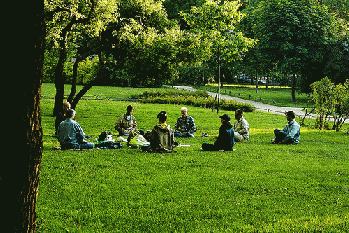It seems like it is part of human nature to want to belong to and participate in a nonhierarchical group to share our deepest political and spiritual values and beliefs. Perhaps that is why many of us long to be part of a tribe, ultimately a network of tribes or intentional communities.
In mainline Christian churches, I can enjoy the singing and music, sometimes the sermon, if I ignore the theistic doctrines and the neo-conservative or neo-liberal foreign policies of the members shared during coffee hour.
Even at Unitarian-Universalist churches, you won't find many leftists, though many are progressive Democrats. Moreover, I don't like the idea of supporting the salary of a minister, who often does not seem any more enlightened than the rest of us. I do like the fact, however, that more UU churches are allowing mindfulness and Buddhist meditation groups to meet at their churches.
Unity and Science of Mind churches that I have attended are more likely to support the perennial philosophy (as found in the Bhagavad Gita, Advaita Vedanta, Buddhism, Yoga and Zen philosophy, and the writings of Aldous Huxley), which I value, as compared to the Unitarian-Universalist churches, which often take a more intellectual approach to everything.
However, about two years ago, I attended a Science of Mind church around Memorial or Veterans Day. The theme of the service that day, with more American flags added for the occasion, was to honor the troops who gave up their lives, so that we can enjoy our current freedom. I too deeply honor and support our troops, which is why I think we should bring them all home. After attending that particular service, I felt somewhat alienated from the group.
More churches should teach and preach about nonviolence and the importance of diplomacy during Memorial and Veterans Day: "And they shall beat their swords into plowshares, and their spears into pruning hooks: nation shall not lift up a sword against nation, neither shall they learn war any more (Isaiah 2:4)."
It seems like the various Socialist, Communist, and Green groups have their hierarchies and narrow agendas as well. If you are even fortunate enough to live in a city where such groups exist, you will often find that attending their meetings is often like attending a boring, impersonal business meeting.
In Indianapolis where I live there was a socialist group that formed through Meetup.com, which I attended only once, but it has seemingly disbanded, I'm sorry to say. I had suggested at the website that a book discussion group form, but not one person responded to my request. It apparently was not important to the group's agenda. I greatly appreciate the time and energy that many activists put into making public demonstrations to make people aware of the issues. But some of us need more than just that.
In college, my favorite class was a course called The Dynamics of Group Therapy. The eight members in our small group psychologically and emotionally bonded, especially during a weekend retreat, which was a requirement of the course. Moreover, at public libraries, I've noticed there are more Socrates Cafe' groups where participants discuss what is on their minds about very important issues.
The average churchgoer has not studied the Bible scientifically the way a good liberal seminary would direct them. The average person graduating from a typical high school or college has not seriously studied any radical ideas that challenge the worldview as presented by the corporate-owned mainstream media. The average person works in a company that does not have workplace democracy; he or she has to endure a tyrannical and hierarchical system of domination and control.
Growing up at home and in school, the average person has not learned conflict resolution skills or nonviolent communication skills, as taught by Marshall Rosenberg. With tension and pressure at work, followed by marital and family conflicts at home, the average person has little time or energy to think about world religions and political philosophy.
Not very many people understand how important the study of psychology can be to work through interpersonal conflicts, which many people throughout the world are struggling with, among many other problems. Instead of empowering the professional experts, let us teach what they have learned to each other. That is how each person can become empowered by learning more about everything.
(Note: You can view every article as one long page if you sign up as an Advocate Member, or higher).






